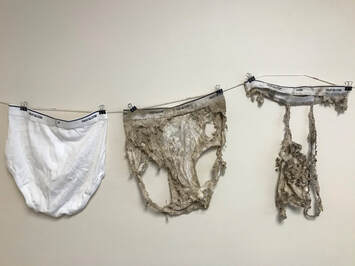CONSERVATION CORNER
A weekly blog for all things conservation
 By: Kevin Brown, Ag Resource Specialist, BCCD You haven’t? Then you just don’t know what kind of soil you are dealing with, do you? This is really a neat little experiment to see just how good your soil really is. How healthy is it? I have written a number of articles about soil health, as you may well know, and this is one way to determine how good your soil is. For those regular readers, how many organisms live in one teaspoon of really good soil? Do you remember? 7-8 Billion. That’s right. There are as many organisms in one teaspoon of soil than there are people who live on the face of the planet!!! Wow. And these little guys are working their tails off, for you! Well, if you have them anyway. So how do we find out if you have them, soil your underwear and you will know. NO, not that way!!
So, take a pair of good, clean, cotton underwear and dig a hole and place them in the ground. You can do this in a field or a garden, it doesn’t matter. Let those little critters in the soil work their magic on those cotton briefs. After about 2 months, (yea, only 2 months) dig them back up again and see how they look. (Yes, you better mark where you put them. We would hate for you to forget where they are. Or even worse, dig up the last pair that you buried there for other reasons. Haha). When you get them back out of the ground, what did you find? Is there anything left of them? If your soil has been beaten down and you are doing everything wrong to promote soil health, you will be able to dust those babies off and put them right back on again. However, if you have some really good microbial action, you will find nothing left except the waistband and maybe the heaviest parts of the underwear where they are sewn together. Nothing else. Imagine that for just a second. After only 2 months, the cotton briefs are, essentially, completely gone. The 8 billion organisms have done their job and completely chewed up the rest of the underwear. These little guys are doing this to every piece of organic matter (OM) they can get ahold of- leaves, hay, straw, twigs, last year’s plants, etc. They can really do a lot of great work. And they are putting it back into the soil for nutrition for the next crop. This is really important information for a lot of reasons. Most of the soil biology that is in the soil is good biology. The more you have, the better your plants do. OM is critical for water infiltration, and even more important in dry years- moisture retention. Decaying OM provides lots of nutrients, but especially nitrogen- probably the most important nutrient for most plants. It provides food for the biology. It gives the soil some “cushion” and areas for the biology to live in. It is just goo all the way around. So, who’s with me? Let’s run out into our fields and soil some underwear!
0 Comments
Leave a Reply. |
AuthorsVarious staff at the Bradford County Conservation District Archives
July 2024
Categories
All
|
|
Bradford County Conservation District
Stoll Natural Resource Center 200 Lake Road, Suite E | Towanda PA 18848 Phone: (570)-485-3144 |
